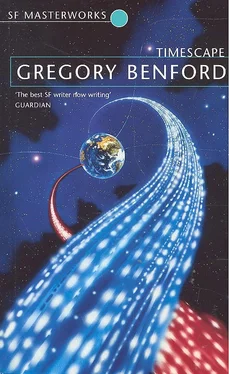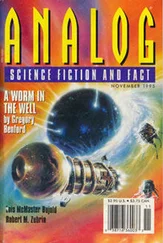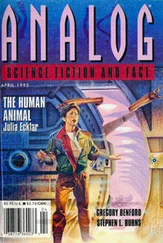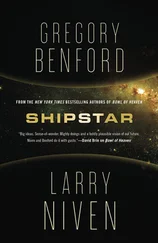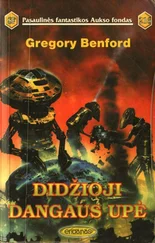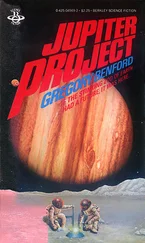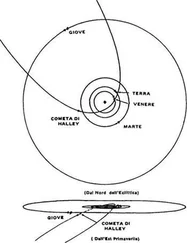“Well, at least they’re doing something.”
“Were you a cheerleader in high school, too?”
“God, you’re a nasty bastard sometimes.”
“Wrong time of the month.”
“Look, Saul is trying to help.”
“I don’t think that’s the way to solve the problem.”
“What is?” When he waved away the question with a faintly disgusted look on his face, she persisted: “Really, Gordon, what is?”
“Forget it. That’s the best way. Just hope everybody else will forget it, too.”
“You don’t really—”
“Sure I do. You should’ve been at that Colloquium.”
She let him cool for a moment and then murmured, “You were confident a week ago.”
“That was a week ago.”
“At least you could work on it.”
“Cooper’s candidacy exam is two days away. I’m going to concentrate on helping him prepare, and then on getting him out. That’s my job” Gordon nodded abruptly, as though having a job to do resolved all issues.
“Maybe you should try something like what Saul’s doing.”
“No point.”
“How can you be so sure?” She folded her arms, sitting back in the rattan chair and looking squarely at him. “Have you ever thought about the rigid way scientists work? It’s like military training.”
“Bullshit.”
“What do they teach you? Write down everything you know about a problem. Set it up in some equations. Most of the time, that’s enough in itself, right? You just push the equations around a little and you’ve got the answer.”
“Not that simple,” Gordon said, shaking his head. But to himself he had to grudgingly admit that there was some truth to what she said. Assign symbols, making the x’s and y’s and z’s the unknowns, then rearrange. Made-to-order thinking. They were all used to it and maybe it hid some elements of the problem, if you weren’t careful. Dyson, for all his wisdom, could be dead wrong, simply because of habits of mind.
“Let’s have chocolate mousse,” Penny said brightly.
He looked up at her. She was going to make this evening end right, one way or the other. He remembered her perched on the toilet and felt a warmth steal over him. She had been both vulnerable and serene sitting there, performing an animal function amid a gauzy gown. Pert, and oddly elegant.
“Vas you-are dinner ex-see-lant, sir?”
Gordon peered at the waiter, trying to estimate if he was queer. “Ah… yes. Yes.” He paused. “Lots better than Chef Boy-Ar-Dee.”
The expression on the waiter’s face was worth the price of the meal.
CHAPTER TWENTY

MAY 31, 1963
ALBERT COOPER’S CANDIDACY EXAMINATION BEgan well enough. Gates, a high-energy physicist, started off with a standard problem. “Mr. Cooper, consider two electrons in a one-dimensional box. Can you write down for us the wave function for this state?” Gates smiled in a friendly way, trying to defuse the tension that oral examinations always had. The student nearly always balked somewhere along the line, unable to summon up some simple piece of physics purely because of his own skittering nervousness.
Cooper worked his way through an opening piece of the problem, sketching the lowest energy state. Then he stalled. Gordon could not tell if this was simple funk or a calculated delaying tactic. Lately, students had hit upon the frowning, silent stall as a method for extracting hints from their committee. Often it worked. After a moment Gates said, “Well then… should the spatial part of the wave function be symmetric?” Cooper responded eventually, “Ah… no… I don’t think so. The spins should be…” and then, halting now and then, he successfully got through the rest.
Gordon felt uneasy as Gates led Cooper through a series of routine questions, all designed to find out if the candidate knew the general background of the thesis problem he proposed to attack. The air conditioning hummed with vacant energy; Cooper’s chalk scratched and squeaked on the board. Gordon eyed Bernard Carroway, the astrophysicist. No trouble there. Carroway looked bored, impatient to be done with this ritual and get back to his calculations. The fourth and last member of the committee was the only problem: Isaac Lakin. As senior professor in the field of Cooper’s thesis, his presence was unavoidable.
Gates finished his simple questions and Carroway, blinking sleepily, passed to Lakin. Here it comes , Gordon thought.
But Lakin was not so direct. He took Cooper through a discussion of Cooper’s own experiment—usually safe ground for the student, since that was what he knew best. Lakin stressed the theoretical underpinning for the nuclear resonance effects. Cooper wrote down the scaling equations, working quickly. When Lakin probed deeper, Cooper slowed, then stopped. He tried the stalling tactic. Lakin saw through this and refused to give Cooper any meaningful hints. Carroway began to take an interest, sitting up straight for the first time during the examination. Gordon wondered why a student in difficulty always provoked more attention from a committee; was it the hunting instinct? Or a proper professorial concern that the student, presumed to be accomplished until he proved otherwise, had suddenly betrayed a fatal ignorance? Either answer was too simple, Gordon concluded.
By now Lakin had Cooper on the run. Lakin made him frame a clear picture of the theoretical model and describe the underlying assumptions. Then Lakin cut Cooper’s explanation to ribbons. His statements were vague, his reasoning sloppy. He had neglected two important effects. Gordon sat absolutely still, not wanting to interrupt because he still clung to the hope that Cooper would right himself after being blown over in this quick storm, and begin to answer correctly. That hope faded. Gordon remembered Lakin relating a comment he had written on a thesis some years ago: “Young man, there is much in this work which is original and much which is correct. Unfortunately, what is correct is not original, and what is original is not correct.”
Carroway joined in with a few incisive questions. Cooper seemed to make headway, then reverted back to his withdrawal mode, stalling for time. But in a two-hour examination there is more than enough time to uncover weaknesses. Carroway listened to Cooper’s floundering replies, eyes still half-closed, but now obviously alert, a sour expression spreading across his face. Gates peered at Cooper as if to understand how a student who had appeared bright only moments before could now be in such trouble. When Cooper turned to answer a sally from Lakin, Gates shook his head.
Gordon decided to step in. It was not a good idea to defend your student very much in the candidacy examination precisely because it was so obvious, and it implied that you, too, conceded the student’s defects. Gordon spoke up, interrupting the flow of Carroway’s probes. He pointed out that in the time remaining the committee had to consider the form and details of Cooper’s experiment, and they hadn’t touched on that yet. This worked. Gates nodded. Cooper, who had been standing with his back pressed to the blackboard, smiled with evident relief. The committee room filled with the small sounds of hands riffling through papers, bodies shifting position in uncomfortable chairs: the earlier mood was broken. Cooper could repair some of the damage.
Five minutes passed smoothly. Cooper explained his experimental setup, elaborated details of the rig. He passed around samples of his early results.
Lakin gave these papers scarcely a glance. Instead, he slipped some pages of his own into the set of data and passed them to Cooper. “My concern here, Mr. Cooper, is not only with the easy-to-understand results. I am sure the committee will find them unsurprising. What I wish to know is whether they are correct.”
Читать дальше
